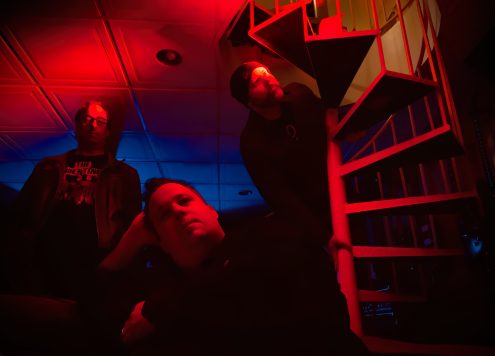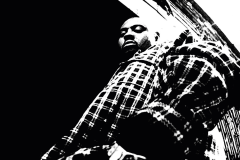It was Friedrich Nietzsche who said, “Let us beware of saying that death is the opposite of life. The living being is only a species of the dead, and a very rare species.” One of those rare creatures is Nicole Hummel, who also goes by the name Nika Roza Danilova. Her stage name is Zola Jesus and the singer, whose music combines electronic, industrial, classical, and goth, has a new album out after a three year hiatus. The album – Ovoki – questions death in all its various guises.
“What does it mean to be alive?” she asked me while discussing her dark-themed album. “Is it a curse or a gift?” It has been a few years since her last full-length album. Taiga came out in 2014 to generally favorable reviews. Since then, much has happened to the singer, who has been compared to such singers as Florence Welch (Florence and the Machine), Elizabeth Fraser (Cocteau Twins) and Siouxsie Sioux (Siouxsie and the Banshees).
“The last couple of years I’ve had those around me that I love want to die and others who were fighting not to die.” Those close to her were battling severe depression and were considering suicide, while others were battling terminal illnesses and close to death’s door. All of this informed her new music and the eleven tracks are redolent with the spectre of life’s end.
“There are no promises for what happens next,” she says. “We need to live life here. Why waste our time here for some future life that no one knows even exists?” She doesn’t think there is any future beyond this one life.
A fan of the Nihilists – she studied philosophy in college at the University of Wisconsin, as well as French and business – she thinks what’s next is nothing. Nihilism is a philosophical doctrine that suggests the lack of belief in the reputed meaningful aspects of life. This is to say, life is without objective meaning, purpose, or intrinsic value. “Hope in reality is the world of all evils,” Nietzsche wrote, “because it prolongs the torments of man.”
Truth be told, Zola Jesus has been tormented. Those around her were struggling while she, herself, was struggling. She’s taken anti-depressants and has anxiety disorders. All of it informs the new album, thickly highlighted with her soaring voice (she studied opera for a time), haunting lyrics, and impassioned melodies. The first track she released from the album was “Exhumed,” a pulse-quickening angered anthem. Gothic pop, it melds glitchy electronics with surging strings. There are thick walls of sound with her voice pouring over it. “The knife deep and spit out,” she howls, “swallow smoother, knocking, impalpable sever in two and fuse to bone.”
She writes about the new album this way – “Each of us is born with a unique debt, and we have until we die to pay it back. Without this cost, what gives us the right to live?” About life, Mary Oliver wrote, “Instructions for living a life. Pay attention. Be astonished. Tell about it.” Through her music, Zola Jesus is telling about it – as painful and heart-rending as it is.
Born and raised in Wisconsin, the singer was surrounded from an early age with that knife’s sever – the living on one side, death, the other. “I come from a family of hunters. We would eat what we killed. What was their death but help me live?” Death, she learned as a child, was a natural thing, just another scene on the same ever-turning stage. “We come one with the earth again. We become fertilizer.” This is what she thinks will happen to her when she dies.
She lives in the woodlands of Wisconsin, where she’s returned after living some time in Seattle and beyond. She wrote of coming back home, “I built a little house just steps away from where my dilapidated childhood tree fort is slowly recombining into the earth. Okovi was fed by this return to roots and several personal traumas.” She’s come to believe we are like trees. Nothing comes of us but being introduced to the soil. There is no heaven. No soul. No mystical afterlife. Though she appreciates, and follows, some aspects of Buddhism, she thinks it relies too heavily on the afterlife.
To find Zola Jesus’s truth – look no further than your CD player. The new album points and points again to her truth – that what we lose is lost, what we have is ephemeral, and what we do with this time is ours – good or bad – it’s all we have. She collaborated on the new album with longtime live bandmate Alex DeGroot, producer-musician WIFE, cellist Shannon Kennedy (Pedestrian Deposit) and percussionist Ted Bynes. “This album helped teach me to let go of things I can’t control. It helped me prioritize empathy. It helped me see that there is a purity in the present.”

Presently – the album should catapult Zola Jesus greater fame. The album is earnest, personal, soaring, searing, beautiful, angry, sad, hopeless and hopeful. It’s her best album to date. Okovi is a Slavic word (Zola Jesus has Eastern European roots) for “shackles.” Zola Jesus said of her album, “We’re all shackled to something – to life, to death, to bodies, to minds, to illness, to people, to birthright, to duty.”
What is her duty? What is her birthright? She has struggled recently with those questions and though this album might not have all the answers to those questions, it has helped her illuminate her own darkness and she hopes it does the same for others.
She wrote the songs during a particularly dark period in her life. Aside from those dying around her, she was having, as she puts it, “a reckoning of truth.” She came to the realization that the world owed her nothing. That there was no validation for her simply being alive. That there is, as she tells me, “no magic behind the curtain. But, from that, one can find fantastical things, moments of surprise and contentment. Berries on a bush. A forest.”
Simple and basic things can be beautiful if you look at them with recalibrated eyes. If you give them no more than what they are, they elevate to something beyond themselves. And, then again, are still just that simple thing. Humans are the same, she thinks. Just creatures passing through.
“As long as you still experience the stars above you,” Nietzsche wrote, “you still lack a viewpoint of knowledge.” Zola Jesus is giving her viewpoint with a beautiful dark and starlit shimmering album for this moment in her life. For this time in her life, forever fleeting.
Zola Jesus – Website | Facebook | Twitter
Words by Jonathan Shipley











Social Media